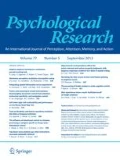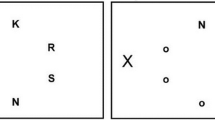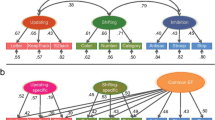Abstract
This study explores the effects of memory retrieval in task switching. To this end, item-specific stimulus-to-task mappings were manipulated in two “alphabet-arithmetic” experiments. Letter-stimuli were presented and the responses were verbal letter names. The task was either to name the next letter in the alphabet, (e.g., C → “D,” task “plus”), or to name the preceding letter (e.g., C → “B,” task “minus”). The mapping of individual stimuli to the two tasks (and thus to responses) was either consistent (CM) or varied (VM). In Experiment 1, performance was worse for VM items relative to CM items, indicating item-specific task-mapping effects. These task-mapping effects also contributed to mixing costs (i.e., worse performance in mixed-task blocks than in pure-task blocks) but not to switch costs (worse performance in task-switch trials than in repeat trials within mixed blocks). Experiment 2 manipulated pure and mixed tasks between-participants, and the data again showed differential effects of the task-mapping manipulation on mixing costs and switch costs. This suggests that, in these memory-dependent, alphabet-arithmetic tasks, interference due to involuntary task (and/or response) retrieval primarily increases general multi-task effects, such as maintaining activation of the current task.
Similar content being viewed by others
References
Allport, A., & Wylie, G. (1999). Task-switching: Positive and negative priming of task-set. In G. W. Humphreys, J. Duncan, & A. M. Treisman (Eds.), Attention, space and action: Studies in cognitive neuroscience (pp. 273–296). Oxford: Oxford University Press.
Allport, A., & Wylie, G. (2000). Selection-for-action in competing (Stroop) tasks: “Task-switching,” stimulus-response bindings, and negative priming. In S. Monsell & J. S. Driver (Eds.), Attention and Performance XVIII: Control of cognitive processes (pp. 35–70). Cambridge, MA: MIT Press.
Allport, A., Styles, E. A., & Hsieh, S. (1994). Switching intentional set: Exploring the dynamic control of tasks. In C. Umiltà & M. Moscovitch (Eds.), Attention and Performance XV: Conscious and nonconscious information processing (pp. 421–452). Cambridge, MA: MIT Press.
Braver, T. S., Reynolds, J. R., & Donaldson, D. I. (2003). Neural mechanisms of transient and sustained cognitive control during task switching. Neuron, 39, 713–726.
Goschke, T. (2000). Intentional reconfiguration and involuntary persistence in task-set switching. In S. Monsell & J. Driver (Eds.), Attention and Performance XVIII: Control of cognitive processes (pp. 333–355). Cambridge, MA: MIT Press.
Jersild, A. T. (1927). Mental set and switch. Archives of Psychology, 89.
Keele, S. W., & Rafal, R. (2000). Deficits of task set in patients with left prefrontal cortex lesions. In S. Monsell & J. Driver (Eds.), Attention and performance XVIII: Control of cognitive processes (pp. 627–651). Cambridge, MA: MIT Press.
Koch, I. (2001). Automatic and intentional activation of task sets. Journal of Experimental Psychology: Learning, Memory, & Cognition, 27, 1474–1486.
Koch, I. (2003). The role of external cues for endogenous advance reconfiguration in task switching. Psychonomic Bulletin & Review, 10, 488–492.
Koch, I. (in press) Sequential task predictability in task switching. Psychonomic Bulletin & Review.
Koch, I., & Allport, A. (2004). Cue-based preparation and stimulus-based priming of tasks in task switching. Manuscript submitted for publication.
Kray, J., & Lindenberger, U. (2000). Adult age differences in task switching. Psychology & Aging, 15, 126–147.
Logan, G. D. (1988). Toward an instance theory of automatization. Psychological Review, 95, 492–527.
Logan, G. D. (2003). Executive control of thought and action: In search of the wild homunculus. Current Directions in Psychological Science, 12, 45–48.
Logan, G. D., & Bundesen, C. (2003). Clever homunculus: Is there an endogenous act of control in the explicit task cuing procedure? Journal of Experimental Psychology: Human Perception & Performance, 29, 575–599.
Logan, G. D., & Bundesen, C. (in press). Very clever homunculus: Compound stimulus strategies for the explicit task-cuing procedure. Psychonomic Bulletin & Review.
Logan, G. D., & Etherton, J. L. (1994). What is learned during automatization? The role of attention in constructing an instance. Journal of Experimental Psychology: Learning, Memory, & Cognition, 20, 1022–1050.
Los, S. A. (1996). On the origin of mixing costs: Exploring information processing in pure and mixed blocks of trials. Acta Psychologica, 94, 145–188.
Mayr, U. (2001). Age differences in the selection of mental sets: The role of inhibition, stimulus ambiguity, and response-set overlap. Psychology & Aging, 16, 96–109.
Mayr, U., & Kliegl, R. (2000). Task-set switching and long-term memory retrieval. Journal of Experimental Psychology: Learning, Memory, & Cognition, 26, 1124–1140.
Meiran, N. (1996). Reconfiguration of processing mode prior to task performance. Journal of Experimental Psychology: Learning, Memory, & Cognition, 22, 1423–1442.
Meiran, N. (2000). The reconfiguration of the stimulus task-set and the response task-set during task switching. In S. Monsell & J. Driver (Eds.), Attention & performance XVIII: Control of cognitive processes (pp. 377–400). Cambridge, MA: MIT Press.
Meiran, N., Chorev, Z., & Sapir, A. (2000). Component processes in task switching. Cognitive Psychology, 41, 211–253.
Meuter, R. F. I., & Allport, A. (1999). Bilingual language switching in naming: Asymmetrical costs of language selection. Journal of Memory & Language, 40, 25–40.
Monsell, S., Yeung, N., & Azuma, R. (2000). Reconfiguration of task-set: Is it easier to switch to the weaker task? Psychological Research, 63, 250–264.
Proctor, R. W., & Vu, K.-P. L. (2002). Eliminating, magnifying, and reversing spatial compatibility effects with mixed location-relevant and irrelevant trials. In W. Prinz & B. Hommel (Eds.), Attention and performance XIX: Common mechanisms in perception and action (pp. 443–473). Oxford: Oxford University Press.
Rogers, R. D., & Monsell, S. (1995). Costs of a predictable switch between simple cognitive tasks. Journal of Experimental Psychology: General, 124, 207–231.
Rubinstein, J., Meyer, D. E., & Evans, J. E. (2001). Executive control of cognitive processes in task switching. Journal of Experimental Psychology: Human Perception and Performance, 27, 763–797.
Schuch, S., & Koch, I. (2003). The role of response selection for inhibition of task sets in task switching. Journal of Experimental Psychology: Human Perception & Performance, 29, 92–105.
Sohn, M.-H., & Anderson, J. R. (2001). Task preparation and task repetition: Two-component model of task switching. Journal of Experimental Psychology: General, 130, 764–778.
Spector, A., & Biederman, I. (1976). Mental set and mental switch revisited. American Journal of Psychology, 89, 669–679.
Waszak, F., Hommel, B., & Allport, A. (2003). Task-switching and long-term priming: Role of episodic S-R bindings in task-switch costs. Cognitive Psychology, 46, 361–413.
Waszak, F., Hommel, B., & Allport, A. (in press). Semantic generalization of stimulus-task bindings. Psychonomic Bulletin & Review.
Yeung, N., & Monsell, S. (2003). Switching between tasks of unequal familiarity: The role of stimulus-attribute and response-set selection. Journal of Experimental Psychology: Human Perception & Performance, 29, 455–469
Acknowledgements
The authors are grateful to Silvija Mikerevic and Barbara Weber for conducting the experiments. Thanks go also to Peter A. Frensch, Robert W. Proctor, Michael Ziessler, and an anonymous reviewer for helpful comments on a previous version of this article.
Author information
Authors and Affiliations
Corresponding author
Rights and permissions
About this article
Cite this article
Koch, I., Prinz, W. & Allport, A. Involuntary retrieval in alphabet-arithmetic tasks: Task-mixing and task-switching costs. Psychological Research 69, 252–261 (2005). https://doi.org/10.1007/s00426-004-0180-y
Received:
Accepted:
Published:
Issue Date:
DOI: https://doi.org/10.1007/s00426-004-0180-y




